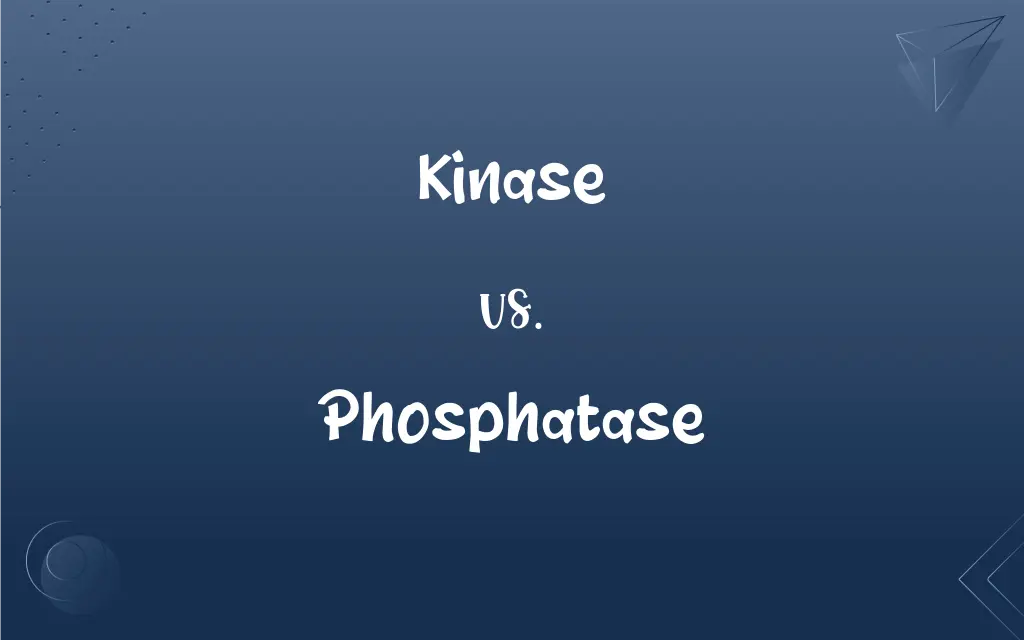Kinase vs. Phosphatase: What's the Difference?
Edited by Aimie Carlson || By Harlon Moss || Published on November 10, 2023
Kinase adds a phosphate group to molecules, while phosphatase removes phosphate groups.

Key Differences
Kinase and phosphatase are both enzymes involved in regulating cellular activities through phosphorylation. However, while kinase facilitates the addition of a phosphate group to proteins and other molecules, phosphatase does the opposite, removing phosphate groups.
Acting as cellular switches, kinase and phosphatase play crucial roles in signaling pathways. The activity of kinase ensures the transfer of a phosphate group from ATP to a specific substrate, typically activating or deactivating it. In contrast, phosphatase reverses this action, ensuring that proteins return to their original state by detaching the phosphate group.
The balance between kinase and phosphatase activities is vital for maintaining cellular homeostasis. Too much kinase activity could lead to excessive phosphorylation, while excessive phosphatase activity might prevent necessary phosphorylation. Thus, cells regulate both enzymes to ensure proper function.
Diseases can arise when the balance between kinase and phosphatase is disrupted. For instance, certain cancers might result from hyperactive kinase signaling. Similarly, diminished phosphatase activity could also lead to aberrant cellular behavior. Both enzymes, therefore, are potential therapeutic targets.
Comparison Chart
Primary Function
Adds a phosphate group
Removes a phosphate group
ADVERTISEMENT
Role in Cell Signaling
Activates or deactivates proteins
Returns proteins to their original state
Effect on Substrate
Phosphorylation (addition of phosphate)
Dephosphorylation (removal of phosphate)
Associated with
ATP consumption
No ATP consumption
Imbalance Diseases
Might lead to cancers
Could cause various diseases
Kinase and Phosphatase Definitions
Kinase
Kinase plays a role in cellular signaling.
Kinase activation can trigger a cascade of events in the cell.
ADVERTISEMENT
Phosphatase
Phosphatase is an enzyme that removes phosphate groups.
Phosphatase activity was found to be higher in the treated cells.
Kinase
Kinase imbalance can cause diseases.
Researchers are targeting specific kinases for cancer treatments.
Phosphatase
Phosphatase counters the action of kinases.
For every kinase in the pathway, there's a phosphatase counterpart.
Kinase
Kinase transfers phosphate from ATP to substrates.
She studied the kinase responsible for this specific reaction.
Phosphatase
Imbalanced phosphatase activity can lead to diseases.
A deficiency in this phosphatase is linked to a specific genetic disorder.
Kinase
Kinase is an enzyme that phosphorylates molecules.
The activity of the kinase determines the protein's function.
Phosphatase
Phosphatase functions in dephosphorylation processes.
The role of this phosphatase is to reverse the kinase's action.
Kinase
Kinase can activate or deactivate proteins.
The mutated kinase constantly activated the pathway.
Phosphatase
Phosphatase helps in returning proteins to their original state.
Without phosphatase, the protein remained activated.
Kinase
Any of various enzymes that catalyze the transfer of a phosphate group from a donor, such as ADP or ATP, to an acceptor protein. Kinases regulate many essential cellular processes.
Phosphatase
Any of numerous enzymes that catalyze the removal of phosphate groups by hydrolysis of phosphate ester bonds. They act in the opposite manner to kinases and are important in metabolism and cell signaling.
Kinase
Any of a group of enzymes that transfer phosphate groups from high-energy donor molecules, such as ATP, to specific target molecules (substrates), in a process termed phosphorylation.
Phosphatase
(enzyme) Any of several enzymes that hydrolyze phosphate esters, and are important in the metabolism of carbohydrates, nucleotides and phospholipids, and in the formation of bone.
Kinase
One of a class of enzymes that catalyze transfer of a phosphate group from ATP to another molecule; it is a type of phosphorylase.
Phosphatase
Any of a group of enzymes that act as a catalyst in the hydrolysis of organic phosphates
Kinase
An enzyme that catalyzes the conversion of a proenzyme to an active enzyme
FAQs
What is kinase?
An enzyme that adds phosphate groups to molecules.
Are kinase and phosphatase opposites?
Functionally, yes: kinase adds and phosphatase removes phosphate groups.
What is phosphatase?
An enzyme that removes phosphate groups from molecules.
Is ATP involved with kinase?
Yes, kinase transfers phosphate from ATP to its substrates.
What's the main role of phosphatase?
To dephosphorylate, returning proteins to their initial state.
Why are kinases important in medicine?
Because they're involved in many diseases, including cancers.
Do all cells have phosphatases?
Yes, phosphatases are essential and present in all cells.
How many kinases are in the human genome?
Hundreds, each with specific substrates and functions.
Can you inhibit kinase activity?
Yes, and certain drugs act as kinase inhibitors for therapeutic purposes.
How do kinase and phosphatase contribute to cell signaling?
They regulate protein functions, impacting signaling pathways.
Are kinases only present in humans?
No, they're found in all organisms, from bacteria to humans.
Can we measure kinase and phosphatase activity?
Yes, various laboratory assays allow their measurement.
How does kinase affect proteins?
By phosphorylating them, which can activate or deactivate them.
Does phosphatase use ATP?
No, it doesn't consume ATP in its action.
Can phosphatases cause diseases too?
Yes, imbalances in phosphatase activity can lead to various diseases.
Is kinase activity always beneficial?
Not necessarily; excessive or reduced kinase activity can be harmful.
What happens if phosphatase activity is too high?
It can lead to excessive dephosphorylation and related cellular issues.
Are kinase and phosphatase activities always linked?
Often, as one adds and the other removes phosphate groups.
Why is the balance between kinase and phosphatase important?
To maintain cellular homeostasis and prevent diseases.
How do cells regulate kinase and phosphatase?
Through various cellular mechanisms ensuring balance in their activities.
About Author
Written by
Harlon MossHarlon is a seasoned quality moderator and accomplished content writer for Difference Wiki. An alumnus of the prestigious University of California, he earned his degree in Computer Science. Leveraging his academic background, Harlon brings a meticulous and informed perspective to his work, ensuring content accuracy and excellence.
Edited by
Aimie CarlsonAimie Carlson, holding a master's degree in English literature, is a fervent English language enthusiast. She lends her writing talents to Difference Wiki, a prominent website that specializes in comparisons, offering readers insightful analyses that both captivate and inform.































































